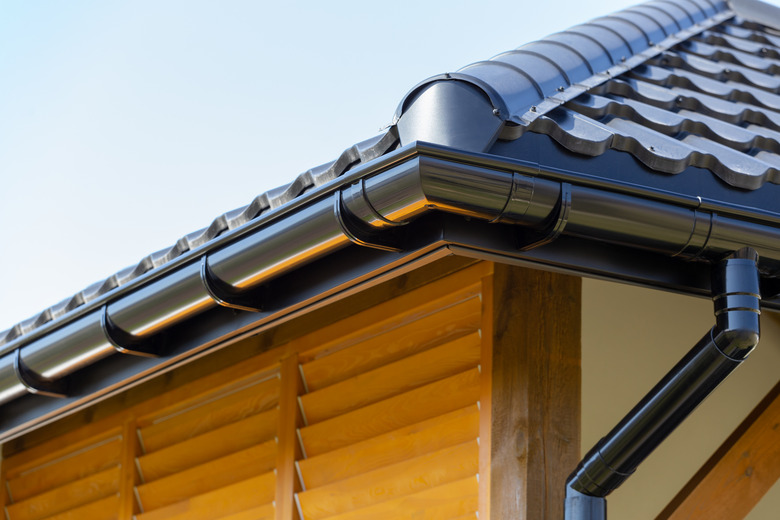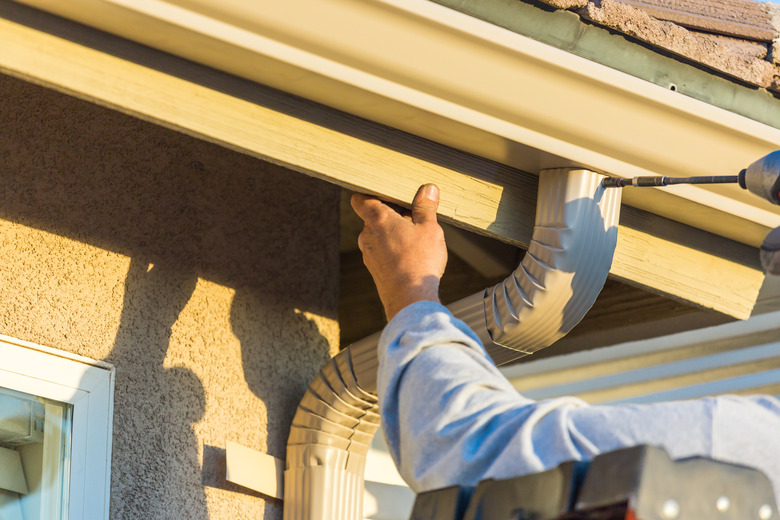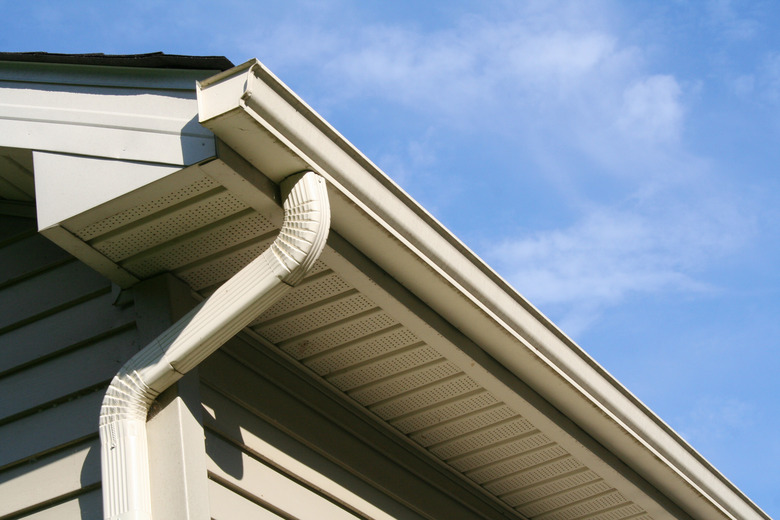What You Need To Know Before You Hire A Gutter Company (And What It Costs)
We may receive a commission on purchases made from links.
A slapdash builder might consider gutter installation an afterthought and neglect to install gutters properly or at all, but the homeowner will soon realize the folly of this approach. The ground around the roof line will become saturated with runoff, and the signs of water damage — including flooding, shifting soil, and soaked and moldy siding — will quickly start to become apparent. An inch of rain produces 6 gallons of runoff for every square foot of roof, which can add up to a lot of water to dump around the perimeter of a home. Far from an afterthought, gutters are an integral part of the roof, and when installed properly and maintained regularly, they provide essential draining that protects the home's siding and foundation and can even help nourish the surrounding landscaping.
Gutters don't seem very complicated, and that leads some homeowners to approach gutter installation and repair as a DIY project. That's fine, but the fact is that there's more to it than meets the eye. Gutters must have a minimum slope of 1/2 inch for every 10 feet toward the downspouts, joints have to be watertight, and both installation and maintenance involve ladder work, which always presents the risk of falling and injury. A licensed gutter contractor has the tools and know-how to install and repair gutters correctly and — importantly — carries liability and workers' compensation insurance to cover accidents, freeing the homeowner from any responsibility for injuries and mishaps.
Ready to hire gutter contractors? Here's everything you need to know — and most importantly, what it costs.
What a Gutter Contractor Does
What a Gutter Contractor Does
A gutter contractor is the person to call whether you need gutter installation, repair, or maintenance. Gutter specialists are general contractors for the most part, although they may also be roofing contractors as well. The jobs they do include:
- Gutter installation: Gutter contractors can generally install all styles of gutters, but in some states, a high-end gutter company that specializes in seamless metal gutters may need to have a metalworker's license.
- Gutter replacement: When gutters have become corroded or the hangers holding them begin to fail, a gutter contractor can replace them. Gutter contractors generally do not address damage caused by failing gutters, such as rotted fascia or siding, but some may depending on the scope of the work they do.
- Gutter repair: A gutter contractor can replace downspouts and damaged parts of sectional gutters and can add gutter extensions to direct water farther from the home. Repair of damage to the soil, foundation, or landscaping caused by roof runoff is not typically part of a gutter contractor's job.
- Gutter guard installation: A gutter contractor can install gutter guards, which are metal or fiberglass mesh screens that prevent debris from collecting in the gutters and clogging the downspouts.
- Gutter cleaning and maintenance: Although home improvement warriors can often do their own gutter cleaning and maintenance, it makes sense to call a professional contractor when tall ladders are needed or when leaks develop. Sealing old gutters often calls for specialized tools and materials that homeowners aren't likely to have on hand.
Doing Your Homework
Doing Your Homework
No reputable gutter contractor will expect you to provide a detailed list of the work you want performed. Most will pay a complimentary visit to your home to survey the situation, make recommendations, and provide you with a quote. There are some situations, however, that require some research on your part.
If your gutters are failing, for example, and you need them replaced or repaired — or if you're installing new gutters — you'll probably want to consider your options. Should you opt for replacing part of your gutter system with identical materials, or would it be better to upgrade the entire system? If you choose to upgrade, what gutter materials would look best on your house, and which can you afford? Among your choices are seamless Galvalume (galvanized aluminum gutters), galvanized steel, or copper gutters — which all tend to be pricey — or budget-friendly sectional vinyl or aluminum ones. Research the material costs before you call so you can better understand the gutter installation cost provided in the quote.
You should also determine what related work needs to be completed, such as replacing the fascia, soffits, or siding so you can find a contractor to do that work because that isn't the type of work that gutter contractors do. A gutter contractor needs to install the gutters with a precise slope toward the downspouts, and the gutters have to maintain that slope in severe weather without leaking, so the surfaces to which they are attached must be solid, rot-free, and in good condition. Some gutter prep work may need to happen before the gutter installers arrive.
When it comes to gutter maintenance and cleaning, you always have the option of doing the work yourself or hiring a handyman, but you should think twice about this if you have a high roof or if the roof is surrounded by power lines. Check out any problems you or someone you hire might encounter, such as sloping or squishy ground that may make a ladder unstable or leaks in hard-to-reach places to determine if they warrant professional installation or repair services.
Why Hire a Gutter Contractor?
Why Hire a Gutter Contractor?
Hiring a professional contractor is the best way to guarantee a gutter installation or repair is done correctly and that you won't need to have work redone in a couple of years, but beyond that is a more compelling reason to opt for a pro. While gutter contractors don't have to be licensed in all states, most contractors do have licenses, and insurance is usually required with licensing. That means you're covered if accidents happen, which is all too possible when workers are moving ladders around and working far enough above the ground for a fall to inflict serious injury.
Another good reason to choose a gutter contractor over a generalist, such as a handyman, is that a gutter specialist has the right tools and materials for the job. That reduces the time spent doing the job and may well result in a lower overall cost. A specialist knows how many hangers and other hardware pieces to bring to the site and exactly where to place them to maintain the proper slope, eliminating the need for time-consuming and costly (for you) trips to the hardware store.
If your preference is to install seamless metal gutters, you'll definitely need a gutter contractor because the gutters have to be prefabricated at the shop or on-site, and that's something you can't do yourself or entrust to a general contractor. Contractors who do this work use specialized tools and techniques, and they may require metalwork licensing depending on where you live.
Choosing the Right Gutter Contractor
Choosing the Right Gutter Contractor
As with any contractor, the best way to find a good one is through referrals from friends or neighbors who have had similar work done to their house. You can also use a search engine to find gutter contractors in your area. It's always a good idea to get two or three quotes to be sure you aren't overpaying, and before you hire a contractor, be sure to ask to see his license, proof of insurance, and references.
The vetting process may need to be more thorough if you're planning to install specialty metal gutters, such as seamless copper, galvanized steel, or Galvalume ones. These are usually either made to order at the shop or fabricated on-site from long sheets of metal and a special machine that forms them into a U-shape so they can be installed in complete lengths rather than being pieced together in sections. Local contractors or building supply outlets can usually direct you to professionals who do the work you need.
Local gutter contractors with good references (don't forget to ask) are preferable to ones who come from far away because they'll be more likely to put extra effort into doing the job right to maintain their reputation in the community. They'll also be more familiar with the type of gutter that works best in your climate.
The Cost of Hiring a Gutter Contractor
The Cost of Hiring a Gutter Contractor
Gutter installation costs depend on the size of the home, the number of stories, and the gutter style and material. Seamless gutters made of aluminum and steel are more expensive than sectional K-style vinyl gutters. Gutter installation costs range from $590 to $1,556 per 200 linear feet, with the national average cost being $1,072. Costs are higher for multistory homes and for premium materials, such as seamless copper gutters.
Some gutter contractors might give you a square foot estimate for gutter installation based on the size of your home and the roof style. Complicated roofs, such as hip roofs, are often easier to quote by the square foot than by the linear foot. The national average for installing aluminum gutters, which are the most common, is about $3,000 for a 2,400-square-foot home.
Most installers charge by the linear foot for gable and other conventional roofs, and the gutter installation cost for seamless gutters usually includes labor and materials. Seamless aluminum gutters can cost anywhere from $6 to $12 per foot, stainless steel from $9 to $20, and copper from $25 to $40. You can find a handy price calculator at Roofing Calculator to determine a fair price based on the size of your house and your choice of gutter material. Sectional vinyl gutters can cost as little as 60 cents per linear foot, while sectional aluminum ones cost around about $2.50 per linear foot. Installation costs vary depending on local labor prices but are usually around $1,200 for a single-story house and $2,000 for a multistory one for both materials.
The cost for gutter cleaning can also be quoted by the square foot or by the linear foot. Average linear-foot prices are $1 for a single-story house and $2 for a multistory one, and average square-foot prices are 40 cents for a single-story home and 80 cents for a multistory one. Costs for both installation and cleaning are usually higher for very high roofs that are difficult to access.
Gutter Contractor Licensing
Gutter Contractor Licensing
When gutter contractors operate independently, they must conform to state licensing requirements for general contractors, and those who are also roofing contractors may have to acquire special licensing from the state. Not all states require general or roofing contractors to be licensed at the state level, although some defer to local authorities to issue licenses. In states where no local or state licensing is required, roofing and gutter contractors can choose to be voluntarily certified by a local trade association, such as the Georgia Roofing Contractors Association or the Kentucky Roof Contractors Association.
Beyond professional accreditation, gutter contractors need a business license to operate as a business, and this usually carries with it a requirement to maintain active liability and workers' compensation insurance policies. This is a bare minimum requirement for homeowners who want to avoid liability in case of an accident, so ask to see the license and proof of insurance before hiring a gutter contractor.
References
- HomeAdvisor: How Much Do Gutters & Downspouts Cost To Install Or Replace?
- Werner Roofing & Exteriors: What to Know About Hiring a Gutter Contractor
- Roofing Calculator: Cost of Gutters Calculator | Estimate Seamless Gutter Prices
- HomeAdvisor: How Much Does It Cost To Clean Gutters?
- Next: Roofing License Requirements by State – How to Get a Roofing License?
- Barry Best Seamless Gutters: 6 Golden Rules When Hiring a Gutter Installation Company


